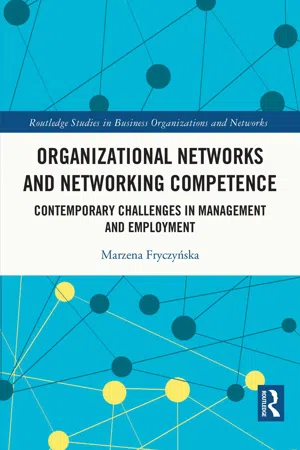
Organizational Networks and Networking Competence
Contemporary Challenges in Management and Employment
Marzena Fryczyńska
- 264 Seiten
- English
- ePUB (handyfreundlich)
- Über iOS und Android verfügbar
Organizational Networks and Networking Competence
Contemporary Challenges in Management and Employment
Marzena Fryczyńska
Über dieses Buch
Networks and networking are essential concepts that transform organizational, economic, and social practices. Human capital is both a source of competitive advantage and a value that allows individual employees to develop their careers and find satisfaction in their employment. The book addresses the vital issue of changes occurring in management and employment, with the growing career individualization, focus on future professional challenges, importance of knowledge workers, and possibilities of functioning in social and organizational networks.
Workers' networking competence is the main theme of this book. Much attention is put on differentiating it from other types of competence and other network objects, and identifying its behavioral manifestations, as the frequency of such behaviors can be used as a measure of an individual's networking competence level. Employment-related variables and characteristics that affect networking competence are analyzed in depth, as is the impact of networking competence on career success and employability — thus laying a foundation for transformation in network organization management, employee relations, and individual career development.
It will be of interest to researchers and students alike, as it clearly demonstrates a way to solve research problems in management science and provides new instruments for further research on networks and networking; and to organization managers and employees, as it offers insights into management and employment-related trends as well as guidelines for managing network organizations and building one's career within social and organizational networks.